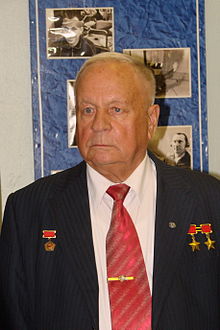Viktor Gorbatko
Viktor Vasilyevich Gorbatko | |
|---|---|
 Viktor Gorbatko in Vologda (2011 year) | |
| Born | December 3, 1934 |
| Nationality | Soviet |
| Occupation | Pilot |
| Awards | Hero of the Soviet Union (2) Order of Lenin (2) |
| Space career | |
| Cosmonaut | |
| Rank | Major General, Soviet Air Force |
Time in space | 30d 12h 47m |
| Selection | Air Force Group 1 |
| Missions | Soyuz 7 Soyuz 24 Soyuz 37 |
Mission insignia | File:Soyuz-7-patch.png |
Viktor Vasilyevich Gorbatko (Template:Lang-ru; born December 3, 1934) was a Soviet cosmonaut who flew on the Soyuz 7, Soyuz 24, and Soyuz 37 missions.[1]
Early life
Viktor Vasilievich Gorbatko was born on December 3, 1934 to Vasili Pavlovich and Matrena Aleksandrovna Gorbatko.[2] Viktor was raised in the Northern Caucasus settlement of Ventsy-Zarya in the Gulkevich district. Gorbatko had four siblings, an older brother, Boris, two older sisters, Elena and Valentina, and Ludmila, the youngest sibling. Viktor was given the opportunity to learn from Nadezdha Karaulova who taught from ABC books that were often censored by the Nazi’s of everything that had to do with the Soviet histories. Viktor finished seventh grade in 1949 and then attended a secondary school in the Novokubanski district.[2]
Personal Life and Career
Viktor’s interest in becoming a pilot was sparked during the conflict between the Soviet’s and the Nazi’s. His siblings often told him stories of brave pilots and their adventures and he too followed in their footsteps. Upon joining the Soviet Army in 1952, Viktor requested to be assigned to flight school.[2] Following his enlisting, Viktor was sent to the 8th Military Aviation School of Pilot Basic Training in the Ukrainian town of Pavlograd, Dnepropetrovsk Region where he was taught to fly. Viktor graduated on June 23, 1956 as a lieutenant in the Soviet air force.[2]
Gorbatko married his first wife Valentina Pavlovana Ordynskayar. Gorbatko also had two children, Irina his first daughter, and Marina, his second daughter, in 1960.
Gorbatko became part of the 86th Guards Fighter Regiment of the 119th Fighter Division, attached to the 48th Air Army operating out of the Odessa Military District in Moldavia. On June 22, 1957, Gorbatko achieved the rank of senior pilot. He would not achieve the senior lieutenant ranking until August 6, 1958, and in October would achieve the military pilots ranking, third class.[2]
After leaving the space program in 1982 he taught at the Air Force Engineering Academy in Moscow.
Awards
His multiple Soviet and Russian Federation awards include:
- Twice Hero of the Soviet Union
- Pilot-Cosmonaut of the USSR
- Three Orders of Lenin
- Order of Friendship
- Order of the Red Star
- Medal "For Distinction in the Protection of the State Borders"
- Medal "For the Development of Virgin Lands"
- Jubilee Medal "50 Years of the Soviet Militia"
His foreign awards include:
- Hero of the Mongolian People's Republic
- Hero of Socialiat Labour (Vietnam)
- Order of Sukhbaatar (Mongolia)
- Order of Red Banner (Mongolia)
- Medal "50 Years of the Mongolian People's Revolution"
- Medal "60 Years of the Mongolian People's Revolution"
- Medal "50 Years of the Mongolian People's Army"
- Medal "60 Years of the Mongolian People's Army"
- Medal "40 years Khalkhin Golskoy Victory" (Mongolia)
- Medal "30 Years of Victory over Japan's Militarists" (Mongolia)
- Medal of Friendship (Mongolia)
- Medal "Brotherhood in Arms" (East Germany)
- Medal "Brotherhood in Arms" (Poland)
- Order of Ho Chi Minh (Vietnam)

References
External links
 Media related to Viktor Gorbatko at Wikimedia Commons
Media related to Viktor Gorbatko at Wikimedia Commons- The official website of the city administration Baikonur - Honorary citizens of Baikonur
